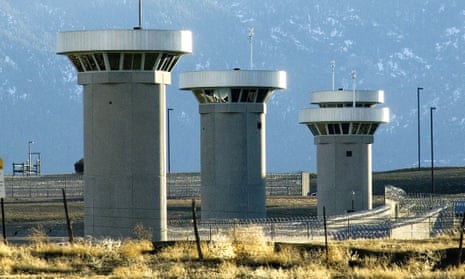A team from the US Defense Department’s policy shop will spend three days this week in Colorado to determine if two prisons in the state might indefinitely hold dozens of Guantánamo detainees.
The latest round of planning in Barack Obama’s long-stalled initiative to close Guantánamo Bay currently involves inspecting a federal Supermax in Florence and a state penitentiary at Canon City to determine their eligibility for continuing the detention of men at Guantánamo whom the US will neither charge nor release.
The team, led by Pentagon official Alisa Stack, already visited military installations at Fort Leavenworth in Kansas and the US navy brig in Charleston, South Carolina, this summer. GOP legislators from Kansas and South Carolina have expressed vocal opposition to moving detainees to their home states. This month, Colorado legislators, including Senator Cory Gardner, added their voices to the opposition.
The survey, the Pentagon said, does not indicate that the administration has made a decision on where it prefers to hold Guantánamo detainees.
“These site visits are informational only. No sites have been selected for holding detainees,” said navy Commander Gary Ross, the Pentagon’s detentions spokesman.
Although Obama and his aides typically describe the hunt for a new detention facility as a crucial aspect of their plan to close Guantánamo, human rights campaigners consider it instead an importation of Guantánamo inside the mainland United States.
They note that the practices that led to international outcries to close Guantánamo– indefinite detention without charge far from any active battlefield and military tribunals – will continue at a US domestic facility, making any claim to “closing Guantánamo” purely cosmetic. A previous iteration of the plan, to hold Guantánamo detainees without charge at an Illinois prison, was dubbed “Gitmo North” by human rights groups.
Fifty-four out of the remaining 114 detainees at Guantánamo have been cleared for release. With the exception of approximately 10 detainees currently facing war-crimes tribunals or convictions, the remainder, under Obama’s plan, would be held indefinitely at a domestic prison.
Bringing any Guantánamo detainees to the mainland US is currently illegal. Obama has vowed to veto the next year’s defense authorization bill over a provision barring the defense department from using funds to bring Guantánamo detainees into the US. Despite the threat, an annual occurrence, Obama has signed four previous defense bills containing the same provision.

Comments (…)
Sign in or create your Guardian account to join the discussion